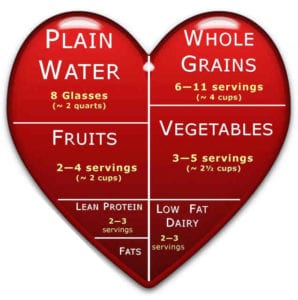Written by Beth Funari Sims Cert. Personal Trainer with Prescription Fitness
It’s Valentine’s Week so let’s talk about our hearts.
First, the not so lovely stats: Heart disease is the leading cause of death for both men and women. According to the CDC roughly 610,000 people die of heart disease in the United States every year – that’s 1 in every 4 deaths.
Some of the risk factors for heart disease include:
- Family history
- High blood pressure
- High cholesterol
- Smoking
- Diabetes
- High alcohol consumption
- Lack of physical activity
- Unhealthy diet
We have control over some of these factors more than others. Diet is especially important when it comes to lowering your risk for heart disease. And, the good news is this is an area we can control!
Here are 5 keys for heart healthy nutrition:
- Limit unhealthy fats. A diet high in saturated and trans fat can to high cholesterol, and coronary artery disease. Limit solid fats like butter, margarine and shortening. Instead load up on healthy fats such as olive oil, vegetable or coconut oil, avocado, nuts and seeds.
- Choose whole grains. Whole grains play an important role in regulating blood pressure, and heart health. Limit white bread, pasta and rice – foods that don’t do your heart any favors. Choose whole-wheat bread, products made from whole-wheat flour and grains like brown rice, barley, quinoa and oatmeal.
- Load up on fruits and vegetables. You can’t go wrong here. Vegetables and fruits are rich in vitamins, and can help lower risk for cardiovascular disease. Two things to stay away from are fruit snacks with added sugar, and soaking your vegetables in butter or rich sauces.
- Be mindful of sodium. A diet high in sodium puts you at risk for high blood pressure – a contributing factor of heart disease. Reduce the amount of salt you add to food while cooking. (Opt for spices like garlic, rosemary, basil etc to add flavor). And if you enjoy prepared food like canned soups choose low-sodium varieties.
- Practice portion control. How much you eat is a key component of a healthy lifestyle. Be mindful of serving size, and pay close attention to hunger cues. Remember too much of anything (with maybe the exception of nutrient-rich leafy greens) isn’t good for your body or heart.

Click on a Subject to Learn More
cardio
Cleveland
client story
corporate wellness
custom fitness
customizable programs
custom programs
custom training sessions
exercise
fitness
Fitness Journey
Fitness Tips
goals
gym
health
healthy lifestyle
home health
home training
in-home training
injuries
injury
inspiration
motivation
muscle
Northeast ohio
Ohio
overtraining
personal trainer
personal trainers
personal training
Prescription Fitness
running
scheduling
Senior Training
strength
strength training
trainer
training
virtual training
weightlifting
weight loss
working out
workout
workout plan
Workout tips



